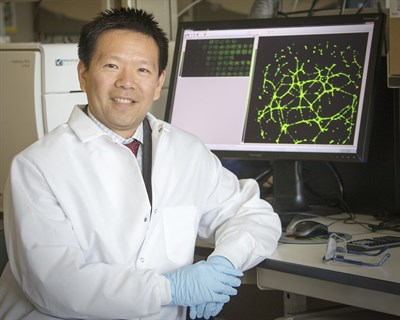Texas A&M’s Chiu Receives Grant Through Gulf Research Program
Weihsueh Chiu, a professor in the Texas A&M College of Veterinary Medicine and Biomedical Sciences’ (CVM) Department of Veterinary Integrative Biosciences (VIBS), has received a $700,000 grant from the National Academies of Sciences, Engineering, and Medicine’s Gulf Research Program (GRP).

Chiu’s project on “Prioritizing Risks from Oil Spills: Supporting Decisions with Read-Across Using 21st Century Exposure and Toxicological Sciences” was one of seven projects from researchers across the country funded through the GRP, the National Academies announced on Jan. 24.
“This project further expands Texas A&M’s commitment to using cutting-edge research and technologies to address the impacts of disasters–in this case, oil spills,” Chiu said. “We are bringing together a world-class, interdisciplinary team that reaches well beyond CVM, including researchers at the Texas A&M School of Public Health and Geochemical & Environmental Research Group, as well as Pacific Northwest National Labs, and the consulting firm Center for Toxicology and Environmental Health.”
For the project, Chiu and his collaborators will use new approaches and technologies in exposure science and toxicology to try to predict the toxicity of substances to which people can be exposed during and after an oil spill.
Because an oil spill can involve a complex mix of interacting substances and environmental factors, which then produces many unknowns that are either difficult or not currently possible to account for, the team will work to address existing limitations and improve assessment and decision-making processes relating to public health risks resulting from oil spills.
“The project will build on and leverage several other recently-initiated projects, including the Texas A&M Superfund Research program and the Institute for Sustainable Communities,” Chiu said. “A key feature of all of these projects is their engagement with local communities and decision-makers involved in disaster response and recovery throughout the research process, so as to accelerate the translation of research into actual practice.”
“This project also will demonstrate the importance of engaging partners like local public health departments in Harris and Galveston Counties to ensure that research is effectively translated into policy and practice to reduce the health impacts of oil spills,” said project collaborator Jennifer Horney, department head and associate professor in the Texas A&M School of Public Health’s Department of Epidemiology & Biostatistics.
The project is one of two funded under the “Improving Risk-Based Evaluations to Support a Public Health Response to the Next Oil Spill” category, for projects focused on improving the information available to decision-makers for evaluating public health risks resulting from oil spills.
“Many decisions relating to public health risks are made following a disaster such as an oil spill,” said Chris Rea, associate program officer for the GRP’s Thriving Communities Initiative. “Risk assessment science inherently involves numerous uncertainties, though, and decisions are limited by what we actually know about potential hazards. The Academies’ report highlighted recent advances that could be used to improve the science behind hazard identification, exposure assessment, and risk characterization, and these two projects are working to apply some of those advances for use in assessing oil spill public health risks.”
The GRP funding competition was specifically geared toward projects that would bring researchers and practitioners together to transfer knowledge and work jointly on efforts that advance both science and its application. All awarded projects were selected after an external peer-review process.
“This funding opportunity is an example of how the Gulf Research Program takes advantage of a core strength of the National Academies – to supply expert consensus on using science to address real-world problems,” said Evonne Tang, the GRP’s director of external funding opportunities. “Two recent reports on topics central to the GRP’s mission were the basis of this grant competition, and the awards direct funding toward efforts that will quickly begin to address the recommendations in those reports.”
The GRP is an independent, science-based program founded in 2013 as part of legal settlements with the companies involved in the 2010 Deepwater Horizon disaster. It seeks to enhance offshore energy system safety and protect human health and the environment by catalyzing advances in science, practice, and capacity to generate long-term benefits for the Gulf of Mexico region and the nation.
The National Academies of Sciences, Engineering, and Medicine are private, nonprofit institutions that provide independent, objective analysis and advice to the nation to solve complex problems and inform public policy decisions related to science, technology, and medicine. The Academies operate under an 1863 congressional charter to the National Academy of Sciences, signed by President Lincoln. For more information, visit national-academies.org.


